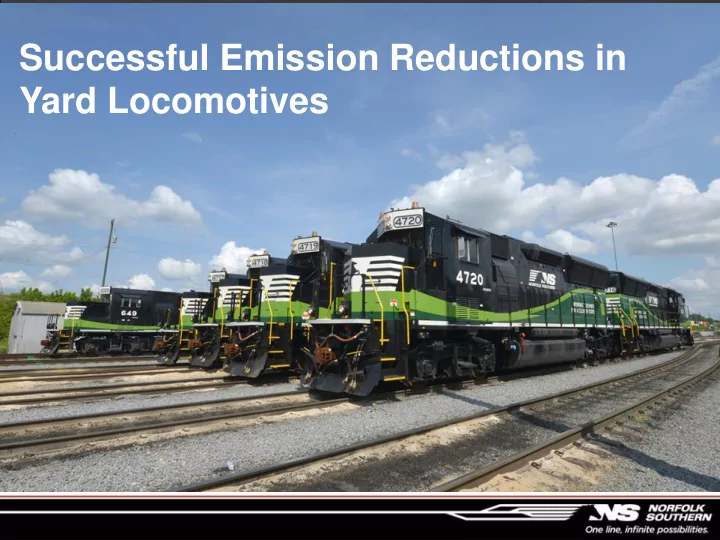

Successful Emission Reductions in Yard Locomotives
Yard Emissions Reductions • Repower • Slug Locomotives • Shore Power
Norfolk Southern Repower Successes • Georgia (GA EPD/GDOT – Grant) – Atlanta - • 10 GP33ECO Mother and Slug sets • 3 SD33ECO Mother and 2 slugs – Rome • 1 GP33ECO Mother and Slug – Macon • 5 SD33ECO Mothers and 2 slugs • Illinois (CMAP Grant) – Chicago • 15 GP33ECO Mothers and 3 Slugs • Pennsylvania (SW PA Commission Grant) – Pittsburgh • 2 GP33ECO Mothers and slug sets
ECO Locomotive Repower Norfolk Southern’s Juniata Shops
What Makes a Locomotive Successful? • Emissions compliant • Can deliver Tractive Effort and Horsepower to the Rail – Wheel Slip – Rapid Horsepower Changes • Reliable – Can withstand the railroad environment • Coupler Slack Run • High Availability – Designed for 184 day maintenance cycles – Must be designed for the “Railroad Business Model” • Long Life – 25 to 30 years
Gensets • Have not proven to be a reliable alternative – Parts availability issues, performance issues, engine durability issues, engine dealer maintenance issues…. • No longer being purchased by Class 1 Railroads
Why have Gensets Failed? 1924 1939 First Production Loco First Successful Production Locomotive GE/ALCO/Ingersol Rand GM Electro-Motive Division • It took 15 years to get the diesel locomotive to work • Much information learned in 15 years on what make a successful locomotive
Locomotive Wheel Slip • When a wheel slips the engine HP is immediately reduced which can lead to smoke • Smoke is also seen in – Horsepower acceleration – Engine throttle transition 1960s Era Locomotive Shown
Locomotive Wheel Slip • Low Friction between wheel and rail • Actual contact area between the wheel and the rail is about the size of a quarter • Wheels slip – loco control backs of power and then re-applies power • Quick transitions that can cause smoke • Smoke is mitigated by an integrated engine/locomotive control system The low friction between the wheel and rail makes rail transportation fuel efficient, but it creates challenges for locomotives pulling abilities as seen by wheel slip
Locomotive Switching – Car Kicking EPA Duty Cycles • Throttle Line Haul Switch DC From a quick look a switcher DC locomotive is rarely in Throttle Notch 8 • REALITY – Switchers are in 8 16.2% 0.8% throttle notch 8 for short bursts 7 3.0% 0.2% of time 6 3.9% 1.5% o Car Kicking o Starting a cut of cars 5 3.8% 3.6% • Horsepower acceleration is 4 4.4% 3.6% critical in switching 3 5.2% 5.8% 2 6.5% 12.3% 1 6.5% 12.4% Idle 38% 59.8% DB 12.5% 0%
Coupler Slack • Coupler movement 1” between pairs • Slack can run in at any time • Abrupt force on locomotive(s) • Can Cause engine damage 1” Entire train couple slack reacts against the locomotives
Successful Locomotive Engines • Both EMD and GE build engines specifically for rail applications • Can handle coupler slack run in • Can support a large alternator
Coupler Slack – Engine Bearings • Crankshaft Main Bearings can be a problem with coupler slack run in GE FDL engine shown upside down Crankshaft Portion
Coupler Slack Mitigation • Locomotive engines must be designed for: – Quick Acceleration – Coupler slack forces • All SUCCESFUL Locomotive engines were designed specifically for locomotive application • Those engines that were NOT initially designed for rail application but for industrial or generator applications have NOT shown to be successful in locomotives
Maintainability • Railroad specific Locomotive Shops • Railroad Employees • 24/7 Coverage • Maintenance Knowledge • Parts Inventory • 184 Day Maintenance Cycles • Railroad Engine Oil • Gensets • Dealer Maintenance • Not 24/7 • Proprietary maintenance instructions • No Parts Inventory • 30 day Maintenance Cycles • Non-Railroad Engine Oil
Summary of a Successful Switcher Locomotive • Emissions Compliance • Engine designed and built specifically for rail service • Integrated locomotive control System • Capable of rapid horsepower acceleration • Maintainability – All Maintenance Instructions provided – Parts Inventory – 184 Maintenance Cycles
Locomotive Slug • Slug - Engineless locomotive that gets power from a mother locomotive • Provides extra tractive effort at lows speeds • Very suitable for switching service • Reduces the need of powered locomotive where 2 locos are Slug under construction at NS Juniata Shops needed for switching
Locomotive Slug
Locomotive Idle Reduction – Shore Power – Electric Engine Coolant Heater Advantages Zero Point Emissions Better emissions savings than Auto Engine Start/Stop Better Energy Savings – Up to 400 kW on a winter day Reduces Starting Battery issues Disadvantages 3 Phase 480 Volt Electrical Connection
Locomotive Idle Reduction – Shore Power Wayside Station Safety Ground Fault Detection Loop Complete Detection Phase Imbalance Detection Ergonomic Less than 18 pound force to manipulate Disadvantage 9 Feet Rail Clearance Requires infrastructure
Conclusions • Successful Emissions reductions are possible through use of repowers with railroad specific engines • Slugs can also provide emissions savings • Shore Power is another successful method of emissions savings. • Questions?
Recommend
More recommend